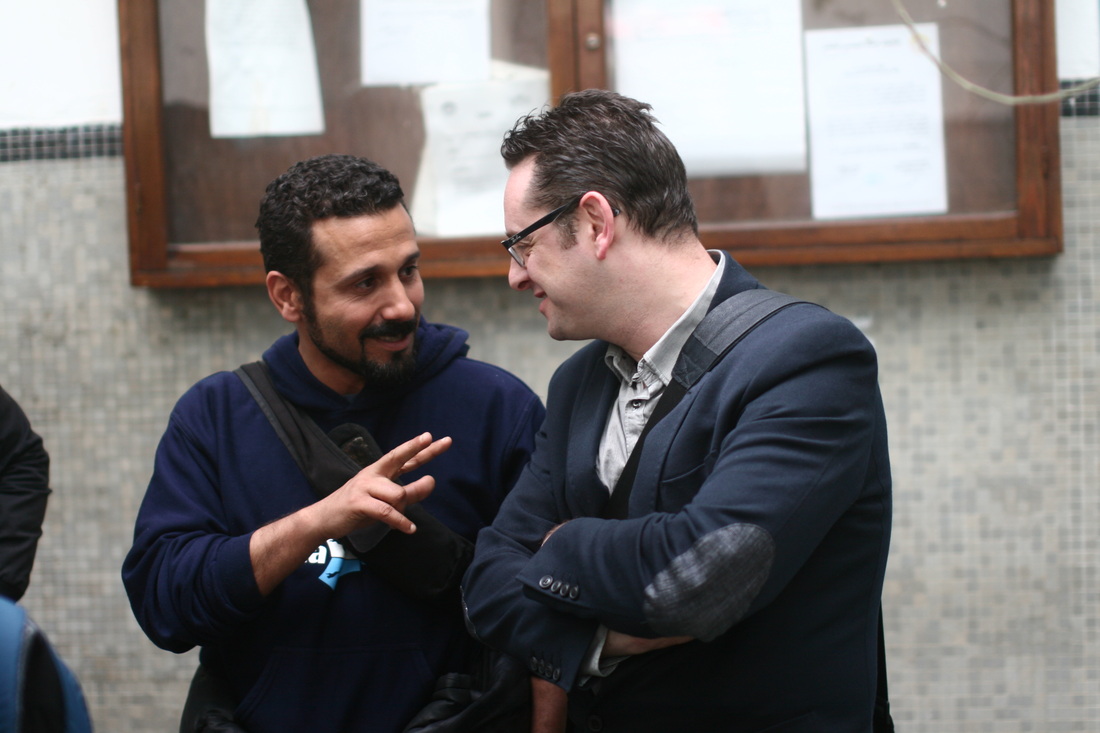|
The biggest achievement of the Tunisian revolution is the way they were able to consolidate the freedom of speech. There are various values who are in conflict, but this creates a type of stability according to Sami Zemni. We see the conflict between transition and cleavage with the old regime. Also the conflict between Secularism and Islam and most of all between labor and capital.
In Tunisia the difference between the capital, tunis, and the interior is very deep. The UGTT is the stronghold of Tunisia and can switch the country of when it wants. While Ennahda (Islamic conservatives) is the biggest party the biggest boat with a Tunisian flag has the name of a pagan goddess. And Tunisia is composed of so many different cultures. The slogan of the first president of the republic was, Bourguiba: “was open for the world, rooted in tradition”. This is all the legacy of Bourguiba, witch Ben Ali continued in one way or another. Now in Tunisia there are is the question what to do with this legacy. Create a society Bourguiba 2.0 and like wise continue the 'Tunésiété'. But this is what the ruling Ennahda party doesn't want, also the Salafists and organizations who want to go back to the root of Islam. Tunisia has become a country who is orientated more towards the Anglo-Saxon world. And the Ennahda behaves like the conservatives in the USA and the left wing parties like the democrats. And that's where the salafists come in, they are against this conservative Anglo-Saxon Ennahda and want a Muslim state. The traditional elite who was in power during French rule was suppressed by Bourguiba, they were chosen by the Islamic belief. Bourguiba introduced a meritocracy in the light of his modernist model. Like wise a new elite surged to power in Tunisia. Ben Ali chose a lot of capable people out of this elite. One thing we can say is that the Ben Ali used the best of the best for his government, so the administration is equipped with high educated elite. The problem is that there is a cleavage between the newly elected cabinets by Ennahda, who are not so highly qualified as the administration. This will provoke new conflicts in the public sector while one again a new Tunisian religious elite is bound to appear in the Tunisian scene. (source: Animo international meeting with Sami Zemni. )
0 Comments
De voorbije jaren kregen maar 1200 Haïtianen per jaar een een visum om te wonen en werken in Brazilië. Volgens officiële cijfers zijn er zowat 15.000 Haïtianen in Brazilië. Een groot deel van hun hebben hun leven in gevaar gebracht om met mensensmokkelaars de tocht te wagen. Lamothe op bezoek in Brazilië
Van 20 tot 25 mei was de eerste minister van Haïti Lamothe op bezoek in Brazilië om economische, sociale en energetische relaties tussen de Brazilië en Haïti te bespreken. Tijdens de ontmoeting met de minister van buitenlandse zaken Antonio Patriota stond op de agenda de ongerustheid van Patriota in verband met de illegale immigratie van Haïtianen naar Brazilië. Op Braziliaanse grond had Lamothe een ontmoeting met Haïtiaanse emigranten, ze vertelden over hun moeilijke situatie in Brazilië, het werd dus duidelijke voor beide staatsmannen dat er dringend voor een oplossing gezorgd moest worden. Eindelijk een oplossing In onderlinge afspraak werd afgesproken dat de Haïtiaanse overheid alles gaat doen om de bevolking te sensibiliseren in verband met de illegale immigratie in samenwerking met de Braziliaanse Ambassade in Haïti. De Braziliaanse overheid heeft van zijn kant de visa restricties opgezegd voor de Haïtianen en het zal zoveel mogelijk visums aanvaarden als de ambassade de capaciteit heeft. De capaciteit is voorlopig 300 per maand. Het enige dat de Haïtianen zullen nodig moeten hebben om een visum te krijgen is een attest van goed gedrag en zeden, een curriculum vitae en een identiteitskaart. Conclusie Deze maatregel komt zeer onverwacht omdat het beleid van Brazilië een jaar geleden loodrecht stond op het actuele. Toen werd er nog gesproken over repatriëring en sluiten van grenzen voor de illegale immigratie. Nu is echter voor een humane oplossing gekozen. Dit strook met het menslijke buitenlandse beleid dat Brazilië wilt voeren om zo een zitje te krijgen in de VN-veiligheidsraad. |
Archives
January 2015
Categories
All
|


 RSS Feed
RSS Feed
